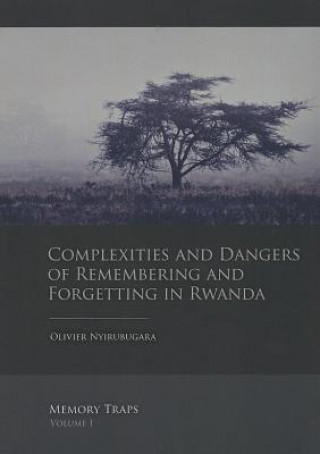
Kód: 05055677
Complexities and Dangers of Remembering and Forgetting in Rwanda
Autor Olivier Nyirubugara
Can a society, a culture, a country, be trapped by its own memories? The question is not easy to answer, but it would not be a bad idea to cautiously say: 'It depends'. This book is about one society - Rwanda - and its culture, tr ... celý popis
- Jazyk:
 Angličtina
Angličtina - Vazba: Brožovaná
- Počet stran: 180
Nakladatelství: Sidestone Press, 2013
- Více informací o knize

Mohlo by se vám také líbit
-

Dune
216 Kč -

Haunting Adeline
621 Kč -

Berserk Deluxe Volume 2
1092 Kč -

White Nights
89 Kč -

Powerless
268 Kč -

Atomic Habits
330 Kč -

Dune Messiah
228 Kč -

Berserk Deluxe Volume 3
1142 Kč -

One Day
221 Kč -

Berserk Deluxe Volume 1
1115 Kč -

Iron Flame
368 Kč -

Surrounded by Idiots
213 Kč -

Harry Potter and the Prisoner of Azkaban (Minalima Edition)
993 Kč -

Gravity Falls Journal 3
443 Kč -

Heaven Official's Blessing: Tian Guan Ci Fu (Novel) Vol. 1
420 Kč -

The Creative Act
568 Kč -

Dune
276 Kč -

Hunting Adeline
624 Kč -

A Little Life
290 Kč -

Children of Dune
230 Kč -

Heaven Official's Blessing: Tian Guan Ci Fu (Novel) Vol. 2
427 Kč
Darujte tuto knihu ještě dnes
- Objednejte knihu a zvolte Zaslat jako dárek.
- Obratem obdržíte darovací poukaz na knihu, který můžete ihned předat obdarovanému.
- Knihu zašleme na adresu obdarovaného, o nic se nestaráte.
Více informací o knize Complexities and Dangers of Remembering and Forgetting in Rwanda
Nákupem získáte 80 bodů
 Anotace knihy
Anotace knihy
Can a society, a culture, a country, be trapped by its own memories? The question is not easy to answer, but it would not be a bad idea to cautiously say: 'It depends'. This book is about one society - Rwanda - and its culture, traditions, identities, and memories. More specifically, it discusses some of the ways in which ethnic identities and related memories constitute a deadly trap that needs to be torn apart if mass violence is to be eradicated in that country. It looks into everyday cultural practices such as child naming and oral traditions (myths and tales, proverbs, war poetry etc.) and into political practices that govern the ways in which citizens conceptualise the past. Rwanda was engulfed in a bloody war from 1990 until 1994, the last episode of which was a genocide that claimed about a million lives amongst the Tutsi minority. This book - the first in the Memory Traps series - provides a new understanding of how a seemingly quiet society can suddenly turn into a scene of the most horrible inter-ethnic crimes. It offers an analysis of the complexities and dangers resulting from the ways in which memories are managed both at a personal level and at a collective level. The main point is that Rwandans have become hostages of their memories of the long-gone and the recent past. The book shows how these memories follow ethnic lines and lead to a state of cultural hypocrisy on the one hand, and to permanent conflict - either open and brutal, or latent and beneath the surface - on the other hand. Written from a memory studies perspective and informed by critical theory, philosophy, literature, [oral] history, and psychology, amongst others, this book deals with some controversial subjects and deconstructs some of the received ideas about the recent and the long-gone past of Rwanda. About the author: Olivier Nyirubugara is a lecturer of New Media and Online Journalism at the Erasmus School of History, Culture and Communication (Erasmus University Rotterdam). In 2011, he completed a PhD in Media Studies at the University of Amsterdam with a dissertation entitled Surfing the Past: Digital Learners in the History Class, in which he empirically explored ways in which pupils use the Web to find historical information. Nyirubugara has also been practicing journalism since 2002 and has been training and coaching journalists in mobile reporting in Africa since 2007.
 Parametry knihy
Parametry knihy
Zařazení knihy Knihy v angličtině Humanities History Regional & national history
799 Kč
- Plný název: Complexities and Dangers of Remembering and Forgetting in Rwanda
- Autor: Olivier Nyirubugara
- Jazyk:
 Angličtina
Angličtina - Vazba: Brožovaná
- Počet stran: 180
- EAN: 9789088901102
- ISBN: 9088901104
- ID: 05055677
- Nakladatelství: Sidestone Press
- Hmotnost: 414 g
- Rozměry: 255 × 186 × 17 mm
- Datum vydání: 31. July 2013
Osobní odběr Praha, Brno a 12903 dalších
Copyright ©2008-24 nejlevnejsi-knihy.cz Všechna práva vyhrazenaSoukromíCookies



 Vrácení do měsíce
Vrácení do měsíce 571 999 099 (8-15.30h)
571 999 099 (8-15.30h)